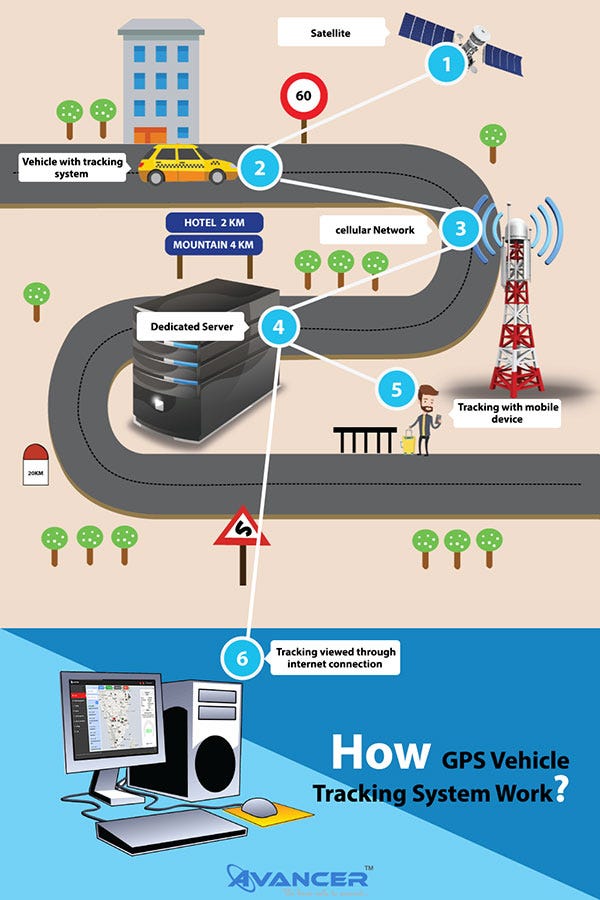Recognizing GPS Tracking: Technology, Applications, and Advantages
Recognizing GPS Tracking: Technology, Applications, and Advantages
Blog Article
Navigating the Future of GPS Monitoring: Developments, Challenges, and Opportunities Ahead
As we stand at the crossroads of technical improvements and societal effects, the landscape of General practitioner monitoring is poised for a transformative trip in advance. With wonderful innovation comes great duty, as data privacy concerns loom huge and safety obstacles in GPS monitoring raise relevant concerns regarding safeguarding delicate information.
Advancement of GPS Innovation
The Advancement of GPS Modern technology has actually been marked by substantial improvements in accuracy, coverage, and efficiency for many years. Originally developed for armed forces objectives, GPS modern technology has advanced to come to be an ubiquitous device in different markets, consisting of transportation, logistics, farming, and individual navigating. Early general practitioner systems were identified by restricted insurance coverage, reduced accuracy, and bulkier hardware needs. However, with continuous technical developments, GPS has transitioned to extra precise and effective systems that use worldwide insurance coverage and boosted precision.
One key turning point in the evolution of GPS modern technology was the growth of Discerning Availability (SA) in the 1990s, which deliberately degraded the accuracy of civilian GPS signals. The discontinuation of SA in 2000 significantly boosted GPS precision for private customers. Subsequent advancements, such as the release of additional satellite constellations like Galileo and BeiDou, have actually further boosted GPS coverage and precision, making it a vital device in daily life. As general practitioner innovation proceeds to advance, we can anticipate more improvements in precision, protection, and performance, opening up new opportunities for advancement and applications across numerous industries.
Real-Time Monitoring Innovations
Building on the developments in GPS technology that have actually transformed accuracy and insurance coverage, real-time monitoring has actually arised as a critical location of innovation with extensive effects across various industries. Real-time monitoring innovations enable organizations and businesses to monitor assets, personnel, and lorries instantaneously, supplying useful insights for decision-making procedures - gps tracking. By leveraging real-time data, business can improve operational performance, improve client service, and guarantee the safety and security and security of their properties
One of the key advancements in real-time tracking is the assimilation of synthetic knowledge and equipment knowing formulas, which enable predictive analytics and anomaly discovery. These capacities enable positive maintenance organizing, route optimization, and risk reduction methods. The development of real-time monitoring systems has actually led to the growth of mobile applications and personalized dashboards, equipping individuals to accessibility vital details anytime, anywhere.
Information Privacy Problems

Information personal privacy concerns encompass various elements, including the storage, sharing, and retention of area data. Services have to implement durable safety and security actions to safeguard general practitioner monitoring information from cyber hazards and data violations. Transparent policies regarding data collection techniques and the purpose of monitoring are important to construct trust fund with customers and ensure conformity with information security laws.
Security Obstacles in GPS Tracking
Resolving data personal privacy worries in GPS tracking is delicately connected to alleviating the safety tests that develop from prospective susceptabilities in the technology. One of the key security obstacles in GPS tracking is the threat of unauthorized accessibility to delicate place information - gps tracking. Cyberpunks could obstruct general practitioner signals, control place info, and even track people without their consent. This not just gets into personal privacy yet likewise poses severe safety risks.

Another security difficulty is the possibility for spoofing or obstructing GPS signals. Executing robust encryption, verification actions, and signal verification methods are crucial steps in attending to these security difficulties in GPS tracking.
Emerging Opportunities in the Sector
The expanding field of General practitioner tracking modern technology provides a myriad of promising opportunities for sector development and advancement. One essential opportunity lies in the development of GPS tracking applications beyond standard fields. GPS monitoring can reinvent person care by enabling remote tracking of vital indicators and guaranteeing prompt clinical aid.
One more significant possibility in the GPS monitoring market is the assimilation of advanced analytics and artificial intelligence. By leveraging these innovations, companies can obtain useful insights from GPS data to improve operational effectiveness, enhance decision-making procedures, and deal personalized solutions to consumers. Additionally, the enhancing demand for linked devices and IoT services presents a ripe chance for GPS tracking companies to expand their offerings and create cutting-edge solutions that deal with a more linked globe. By maximizing these arising opportunities, GPS tracking firms can place themselves for continual development and success in the dynamic landscape of the market.
Final Thought
In conclusion, the future of GPS monitoring is noted by continuous development and innovation in innovation. As the market moves forward, browsing these challenges will be important to ensure the ongoing development and success of GPS monitoring innovation.
With fantastic technology comes excellent responsibility, as data personal privacy worries impend large and security challenges in GPS monitoring raising important questions regarding safeguarding delicate information.With the visite site quick expansion of General practitioner tracking innovation in various sectors, dealing with data personal privacy concerns has become a critical crucial for both services and consumers alike. The collection of location information through GPS monitoring raises substantial privacy problems, as it makes it possible for the monitoring of people' movements and habits. Businesses utilizing General practitioner monitoring must focus on safeguarding this data to avoid unauthorized access or abuse that might jeopardize people' privacy view it rights.
Companies need to execute durable safety steps to protect General practitioner tracking data from cyber hazards and information breaches.
Report this page